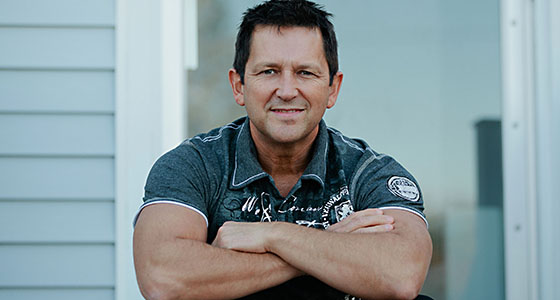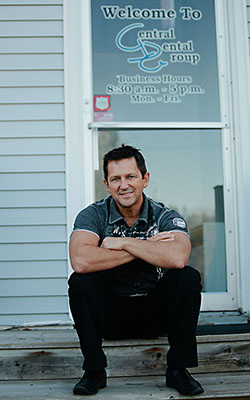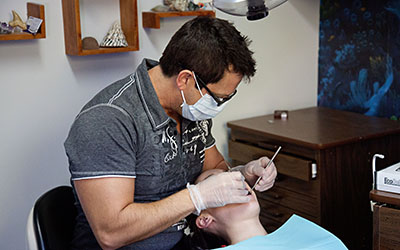
William Nippard (DDH’88): Accidental Revolutionary
By Mark Campbell
William Nippard was certain he was in the wrong place. It was orientation day for incoming Dental Hygiene students at Dalhousie University and, looking around the lobby, he realized he was the only male there.
“I didn’t know this was a predominately female profession,” he says, laughing at his naiveté. “I grew up in rural Newfoundland. I’d never been to a hygienist. I’d never even heard the word before. I didn’t know if I could do this.”
Nippard wasn’t trying to start a revolution; he was essentially starting over. For six terms, he’d been studying biology at Memorial University with an eye to enrolling in Dentistry at Dalhousie. Yet a series of setbacks, including the theft of virtually everything he owned, saw him struggling to stay in the program. A friend suggested Nippard visit Henry King, a dental hygienist in St. John’s, and their conversation encouraged him to change course. He became the first male to graduate from the Dalhousie program.
“It was incidental,” he concedes. “I never set out to be the pioneer and blaze a trail.”
Yet Nippard has become a trailblazer, not just in his profession, but also in the community of Grand Falls-Windsor, N.L, where he lives and works, and beyond. He brought preventive dental care to rural areas of the island, where you only saw a dentist if you needed a tooth pulled. He worked to secure self-regulation for dental hygienists in the province. And he spearheaded the launch of several youth-oriented programs, one of which became the largest of its kind in Newfoundland and Labrador.
“I think it’s important to make a difference; you can’t put words or even a value on it. I think it’s the essence of life.”
A challenge accepted
The son of missionary parents, Nippard certainly had their example to draw on in making the world a better place. Yet it was a pre-graduation talk by Dalhousie professor Terry Mitchell (BSc’74, DDH’78, MEd’89) that really galvanized him.
“She was telling us to never view ourselves merely as someone who cleans teeth. She was encouraging us to take opportunities to be involved in our communities, associations and grow ourselves, as well as our profession. When she asked who would make that commitment, I nervously raised my hand, without quite knowing why. But it resonated with me. I took it as a challenge.”
In 1991, three years after graduating, Nippard rose to that challenge. He was working in a Grand Falls practice when he was approached by a local hospital administrator looking for dentists and hygienists to provide preventative care to the remote, isolated communities of southern NL. Knowing oral health was anything but a priority there, Nippard committed to a few months of visits. He would continue those visits for 20 years.
The first consultations were shocking. It was very common to see children with nursing bottle decay and a large percentage of primary and elementary-aged children with virtually all their teeth decayed to the gum line, scarred with aspirin burn – the conventional remedy for children with toothaches. Knowing people, especially kids, would rather do anything than visit a dentist, Nippard arranged for games and tours of the clinics where he worked to set everyone at ease. Courses of action were set, notes went home and he soon realized parents were not only receptive to the treatments he was suggesting for their children, they also began to ask about their own oral health and make appointments.
Breaking barriers
Although he made considerable progress, Nippard’s work was almost derailed when a dentist raised questions as to why he was conducting clinic visits alone. This contravened the rules of the Newfoundland and Labrador Dental Board, which not only regulated the dental hygiene profession, but also dictated a dentist had to be present for such consultations. Nippard – then president of the Newfoundland and Labrador Dental Hygiene Association – decided a change was in order and sat down with government to push for self-regulation.
 “We had proven it worked. We had the hospital administrator, town officials, school principals and parents testifying to the change that had happened. And we worked to get dentists onside. As a result, dental hygienists became self-regulated in Newfoundland and Labrador.”
“We had proven it worked. We had the hospital administrator, town officials, school principals and parents testifying to the change that had happened. And we worked to get dentists onside. As a result, dental hygienists became self-regulated in Newfoundland and Labrador.”
Not only did professionals like Nippard gain autonomy over where and how they practiced, it led to better dental care in the province. “Before, for example, we couldn’t visit and treat seniors on our own who weren’t able to come to an office. Now, seniors and rural communities have access to care from preventative specialists and self-regulation helped make that possible.”
Sharing wisdom
Nippard continues to promote the importance of oral health through visits to schools around the province. He’s also expanded his good work beyond his profession, just as he committed to do many years ago at Dalhousie. In addition to launching a basketball program for students, he wrote the curriculum for a highly popular youth development initiative called STUFF – Solid Truths Under Fun Friendship. He’s taken the wisdom he’s gathered throughout his career on productive workplaces and compiled it into a best-selling book, “The Teamwork Ladder: 8 Steps To Maximum Success For You & Your Organization.” And he’s donating all the proceeds from that book to help the Live Different organization build houses for families in the Dominican Republic and Haiti.
Currently writing a second book, Nippard splits his time between his work as a dental hygienist, staff development and his humanitarian initiatives. He says the influence of Dalhousie, particularly the encouragement to use your education to give back, resonates through everything he does, from his local presentations, to training small businesses and professional groups across Canada in leadership principles, to his own dental office where he works diligently to provide an experience, rather than a mere service, for every patient he sees.”If there’s an epitaph going on my headstone, I want it to be ‘He made a difference.’ Because I think that’s the greatest compliment you can give someone.”
